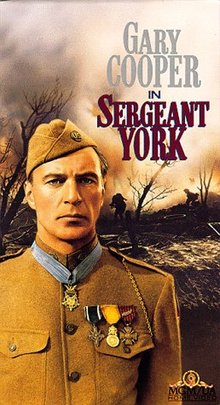| Gary Cooper returned to the class as a soldier instead of a marshall (High Noon), but still playing a guy who does what has to be done. In Sergeant York Cooper wrestled with his own faith, not his wife’s, when faced with the possibility of violence. The struggle was not only more real for his character but for us as viewers as well.
The reason I selected this movie wasn’t just because it dealt with the transformation of a drunken, rowdy wild man into a steady hero, but because it is also an excellent dramatization of someone going to the Bible to thoughtfully sort out a conflict as intense (if not as action-packed) as anything he’d meet on an actual battlefield. |
 |
Other important details I wanted to get across to the boys was the sense of responsibility Alvin York took on after his conversion; how he sought to walk uprightly in dealing with others and his character in refusing to trifle with the heart of the girl he greatly desired until he had the land and the means to support her. Furthermore, while the movie is a story of courage, it is also a story of humility, restoration and redemption and its tangible benefits. Finally, it provides a last lesson in character as the hero, having overcome persecution and the threat of bodily harm, must deal with the seductive appeal of being a celebrity.
Given these heavy themes and the fact that this movie was the oldest and most archaic in terms of production values, I was somewhat surprised when at the end of the semester the boys said that this was their favorite movie and the one they could most relate to.
Questions to Answer:
- What reasons did Mrs. York give for the way Alvin behaved early in the movie? What did she do about it?
- What did Rev. Pile mean when he said “Once the furrows get crooked, it’s hard to get them straightened out again”?
- Why was getting the piece of bottom land so important to Alvin? Why did he initially fail?
- Why did Gracie not want to marry Alvin at first? What did he think was her reason?
- What did Rev. Pile mean when he told Alvin, “You’ve got the using kind of religion, not the meeting house kind”?
- List the following four things in the proper order (as shown in the movie): redemption, humility, blessing and repentence.
- How did Alvin go about resolving the conflict between his belief and his duty?
- Why did Alvin think it was wrong to make money off of what he had done in the war?
Points to Ponder:
- Why was “the set-up” so important when someone wanted to get married. Is this still important today?
- Was Alvin right in believing that he should not kill? Do you think killing in war is permissable?
- Alvin told Pastor Pile that “he had prayed ‘til he was blue in the face.” Pastor Pile replied, “It’s not just prayin’ – it’s believing.” Explain.
- Which do you think is harder to stand firm in the face of – persecution or seduction?












If you’re not already organizing these for later publication, you ought to think about it.
Pingback: Sergeant York, in his own words | thenightwriterblog.com